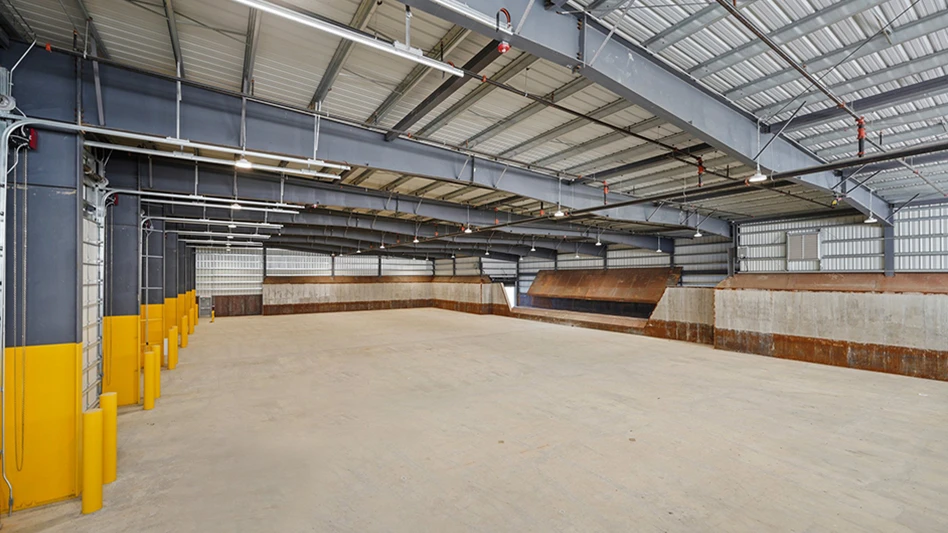
Recycling is a tough business sector to pigeonhole or classify because its activities include commodity trading, value-added manufacturing and wholesale aggregating aspects—among others. Foremost among the “others” is customer service for recycling companies that pick up materials on a scheduled or as-needed basis from commercial or residential customers.
Technology in the form of “smart” containers that let collection companies know when a bin might be full or missing from its assigned spot has been developed to address some customer service needs.
Other forms of admirable customer service more likely will come down to management decisions and employee follow-through. This kind of customer service can help determine whether containers are being picked up conveniently, quietly and in other ways that convince customers the recycling company involved is acting in good faith.
Priority traffic
Recyclers of commercially and industrially generated materials generally understand the customers they serve have delivery and outbound shipping trucks that take priority at their loading docks. That realization can mean early morning or late evening hours can be the ideal time for recyclers to pick up scrap metal or old corrugated containers (OCC) from commercial and industrial customers. Working at those hours, however, can present a new set of considerations in terms of access.
York, Pennsylvania-based waste and recycling hauling company Penn Waste has a list on its website of 10 waste disposal safety tips for its commercial customers, several of which overlap as prompt service considerations. (See the sidebar, “Safe but not sorry,” for additional details on the list.)
When customers provide recyclers keys to open locked gates that protect their containers, it eliminates the need for customers to unlock the area before scheduled pickups and it keeps the area secure.
In central Pennsylvania, as in many other service areas, ice and deep snow can be barriers to prompt container service. The company’s drivers “must have clear and safe access” to service containers at all times, Penn Waste reminds its customers.
However, “Maintenance and snow removal companies tend to pile snow in front of and around [collection bins and storage areas] during the winter,” potentially creating a disruption to service, according to the firm.
Clifton Park, New York-based County Waste and Recycling also provides winter service tips to its commercial and residential customers. The firm reminds its customers to keep driveways, access roads and parking lots plowed and “heavily sanded” so trucks can make their scheduled pickups.
Another off-hours barrier can come in the form of a locked gate, according to Penn Waste. “If your container is in a secured area, please unlock any gates the night before your scheduled pickup,” the company reminds its customers.
Customers also can provide keys to the firm. This “can eliminate the need for [a customer] to remember to unlock the gate” or to have to “leave it unsecured for several hours,” Penn Waste states.
Gated waste and recycling storage areas may not be locked, and the snow could be removed, but winter weather might yet prove to be problematic, according to County Waste and Recycling. The firm says it has encountered instances when a metal pin at the bottom of a gate can be so frozen in place that drivers are unable to get into the enclosed storage area.
Customers might appreciate completing a pickup through all types of weather, but recyclers also risk reminders that their customers have neighbors as well. Those reminders most often occur when container pickup service has been deemed too noisy at an inappropriate time of day.
Easy on the ears
Recycling and waste company managers can find themselves an unwelcome part of a local news broadcast if or when they are the subject of noise nuisance complaints connected to their service vehicles.
In October 2016, a residential recycling and waste company was confronted by a Tampa, Florida, television station stemming from 4 a.m. collection noise nuisance complaints lodged by apartment dwellers in the city.
Responding to viewer complaints of noises allegedly so loud one resident said she thought “a gun went off,” reporters for the TV station learned that commercial waste and recycling collections were permitted as early as 3 a.m. However, a city ordinance provided that no collection (commercial or residential) is permitted before 6 a.m. if residential dwellings are within 500 feet.
Such ordinances can cause routing and scheduling difficulties, but being aware of them also can prevent costly citations.
Larger cities often have ordinances in place and may provide a phone number or website page where haulers can learn more about the ordinance (or through which residents might file a complaint).
In the recycling sector, the sound of glass thrown into metal containers has been a culprit leading to nuisance complaints. In August 2016, neighbors of the Smyrna Recycling Center near Marietta, Georgia, lodged complaints about such noise.
A recycling center manager quoted in an online news item about the complaints says some customers had “a good time” when throwing their glass bottles and jars into the collection bins, resulting in bursts of noise that displeased neighbors.
The solution, in the case of the Smyrna Recycling Center, was to have employees accept incoming glass items from customers and then carefully place the material into bins on their behalf.
For as many containers as a recycling company has to service, a nearly equal number of challenges or potential nuisances require proper attention. Knowing and avoiding these pitfalls, however, can help a company provide service that will retain and please its customers.

Explore the April 2019 Issue
Check out more from this issue and find your next story to read.
Latest from Waste Today
- DPI acquires Concept Plastics Co.
- Laurel Mountain Capital announces investment in 5280 Waste Solutions
- Cielo investor requests annual meeting
- WIH Resource Group celebrates 20th anniversary
- NWRA: NIOSH cuts a step in the wrong direction
- Valicor Environmental services acquires Affordable Waste Management
- WM to debut 4 recycling, RNG projects
- Interchange Recycling's EPR stewardship plan approved in Yukon






